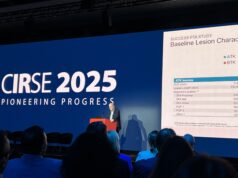
In the EffPac trial, designed to compare a drug-coated and an uncoated balloon in the treatment of vascular occlusion in the femoropopliteal region, the drug-coated device proved to be superior. Additionally, the complete review of the study cohort two years after the intervention showed no increased mortality with the drug-coated balloon.
In cooperation with the Center for Clinical Studies, radiologists at Jena University Hospital, Jena, Germany, initiated an investigation to evaluate the efficiency of the Luminor paclitaxel drug-coated balloon catheter (iVascular) versus an uncoated balloon.
The success of the treatment was measured by the patient’s ability to walk and by ultrasound examinations of the vascular permeability in two follow-up examinations. This prospective, multicentre, randomised controlled trial enrolled a total of 171 participants at 11 centres throughout Germany.
Principal investigator of the EffPac trial Ulf Teichgräber (Jena University Hospital) summarises the result: “Compared to the control group, in the group treated with drug-coated balloon catheters, there was better vascular permeability and less tissue formation at the former constriction two years after the procedure.”
On behalf of the Federal Institute for Drugs and Medical Devices (BfArM) in Germany, the study authors re-checked the complete cohort with respect to morbidity and mortality. The reason for this was a meta-analysis of angioplasty studies published last year that warned of long-term increased mortality associated with paclitaxel-coated devices. This warning triggered discussions amongst experts, since subsequent analyses of patient-level data could not confirm the increased long-term risk.
According to a Jena University Hospital press release, a possible source of error in determining mortality rates is not considering patients who have not completed the entire follow-up programme. “Within the trials considered in the meta-analysis, these patients counted up to a quarter of the subjects. Their data are not included in the study result as if they had not participated at all. However, for mortality assessment, they have to be included. This happened for the first time in the EffPac trial: in the subsequent review, 167 patients were recorded, which represents almost the entire study cohort, thus preventing a misjudgement in comparing the groups,” the press release reads.
The review yielded no difference in the survival after two years between the groups treated with an uncoated balloon or with a paclitaxel-coated balloon. Teichgräber comments: “The mortality risk by drug-coated balloons turned out to be even lower than that shown in the original two-year results recently published. We could confirm angioplasty with paclitaxel-coated balloons to be a long-term successful and safe treatment option for intermittent claudication.”










